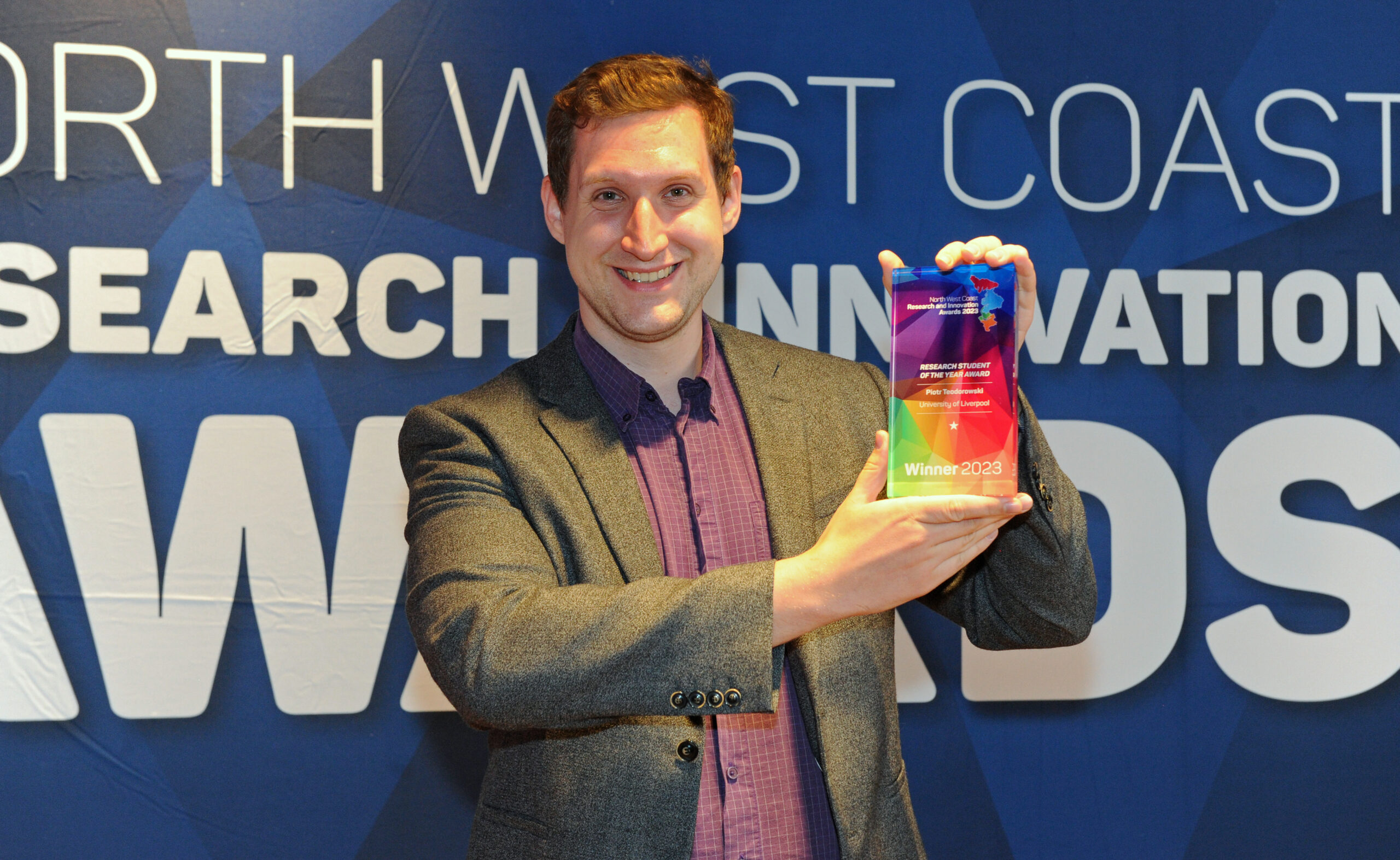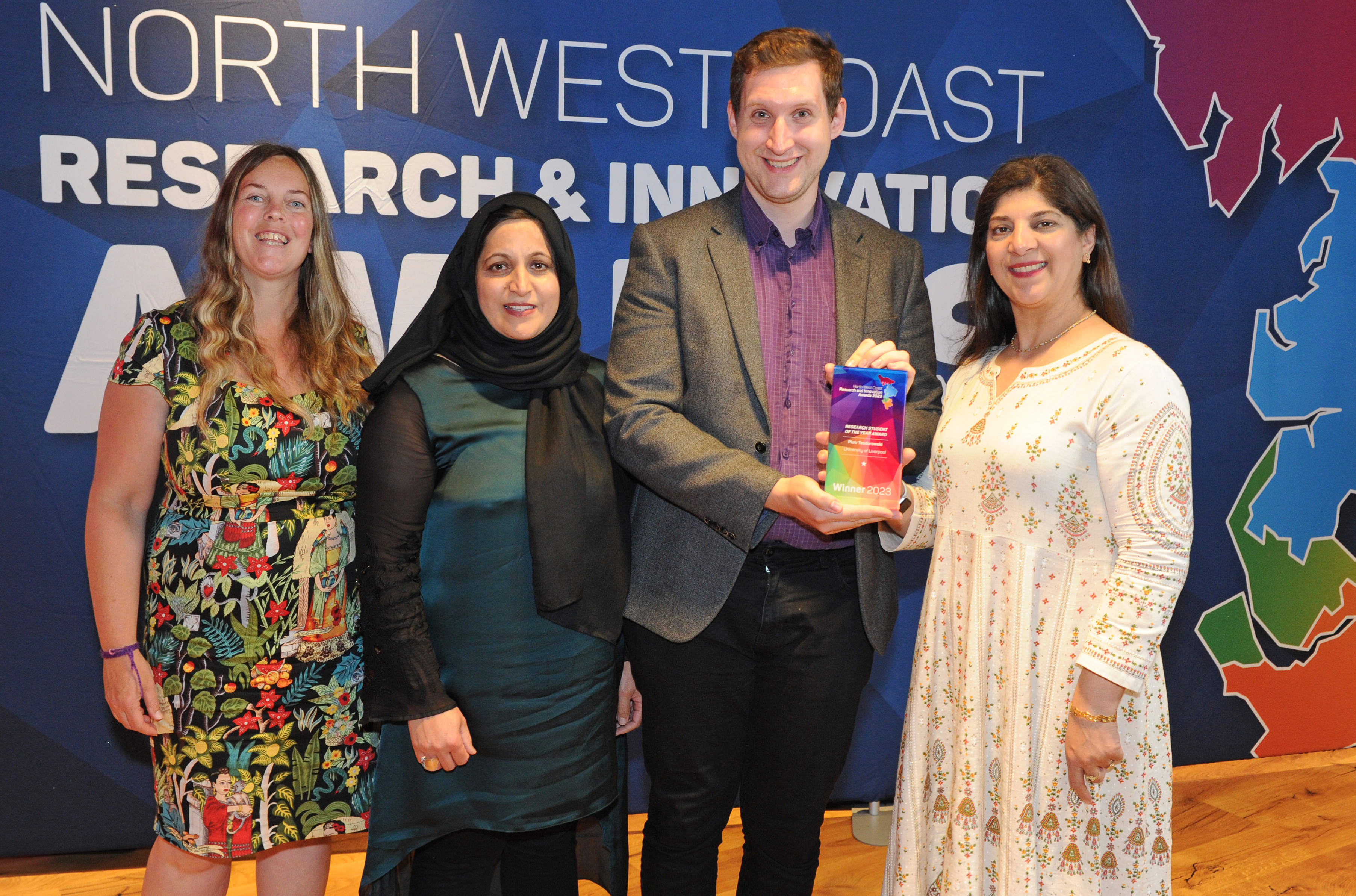Becoming an Expert: ARC NWC PhD Student is giving the underrepresented a voice

Piotr Teodorowski pictured above with his Research Student of the Year Award
ARC NWC PhD student Piotr Teodorowski is based within in health services research within in the Department of Public Health, Policy and Systems at the University of Liverpool. Piotr’s research interests include public involvement & engagement and health inequalities. He has been passionate about these topics since working as Researcher & Community Engagement Officer for the Grampian Regional Equality Council, a charity based in the North East of Scotland. Piotr recently won the Research Student of the Year Award at the North West Coast Research and Innovation Awards for his research exploring the involvement and engagement of seldom-heard communities in big data research.
My research is timely as big data initiatives have grown in the UK in recent years, offering novel research and healthcare solutions. However, despite the importance of collecting data on a mass scale, the public does have concerns about its use in an ethical and security context. One way to establish public support is through public involvement and engagement – ensuring that research is carried out ‘with’ or ‘by’ members of the public rather than ‘to’, ‘about’ or ‘for’ them. My research consisted of three projects:
The power of social media
I explored how social media could be used to engage members of the public around big data research. This was achieved by exploring the #DataSavesLives campaign on X (formerly Twitter), which promotes the benefits of reusing medical data for research.
Researching the researchers
I conducted a study examining the experiences of researchers who are involved and engaged with seldom-heard communities in big data research to capture their experiences. As well as understanding how researchers could improve public involvement and engagement, I felt it was important to include members of the public in my research too. Over the last three years, I have worked with two public contributors who have supported the design of studies, analysis and dissemination and have co-authored papers and co-presented at conferences with me.
Representing the underrepresented
The third project focused on interviews with Polish and South Asian communities that have not been previously involved as public contributors to understand what could influence and encourage their decision to get involved in research.
Alongside my doctoral research, I received two grants from NIHR (SPARC & LA SPARC). This additional funding allowed me to be based in other parts of the country and gain further research and policy experience. First, I was placed with NIHR ARC Northwest London (based at Imperial College London) to facilitate the participatory evaluation of the process of co-producing resources for the public on data science and artificial intelligence. This included working with a group of 30 public contributors who inspired me to reflect more on how the public can become active in research. Second, I worked with South Tyneside Council to evaluate their ‘warm banks’ – a space local residents can visit when they cannot afford heating at home and a public health response to the cost of living crisis. I had an opportunity to speak with people in the local community who run these spaces and the people using them. This is one of the first evaluations of these interventions in the UK and I’m proud that my findings could guide other local authorities who might consider adapting the scheme.
During my doctoral research, I became active within my academic & professional networks and contributed to teaching. Some examples include being a panellist at the NIHR Methodology Incubator or participating in TweetChat discussing my research on the #DataSavesLives. I was also a Postgraduate Research (PGR) representative in my department. These opportunities allowed me to network with colleagues locally and nationally.
Dissemination of my work is important. In addition to publishing papers and presenting the work at local and international conferences, I have been involved in drafting new Public Involvement and Engagement Best Practice Standards for the use of data for Research and Statistics with the Public Engagement in Data Research Initiative (PEDRI). However, my doctoral research findings could apply outside big data research – an example being the training I delivered at Merseyside Police on how to engage seldom-heard communities.
Future plans
After I submit my thesis later this year, I will continue my research career as a health services researcher on two Cancer Research UK-funded projects and work closely with NHS colleagues. This project will help me develop new research skills and gain experience working with patients and within the NHS. Winning the Research Student of the Year Award inspired me to build on my doctoral research. Thus, my further plans include using these experiences to apply for a research fellowship focusing on public involvement.
Piotr picture below with ARC NWC Selina Wallis,ARC NWC Public Involvement manager, Saiqa Ahmed PA Co-Lead, Improving Population Health, Piotr Teodorowski, ARC NWC PhD student and Naheed Tahir, Co-Chair of ARC NWC Seldom Heard Forum.
